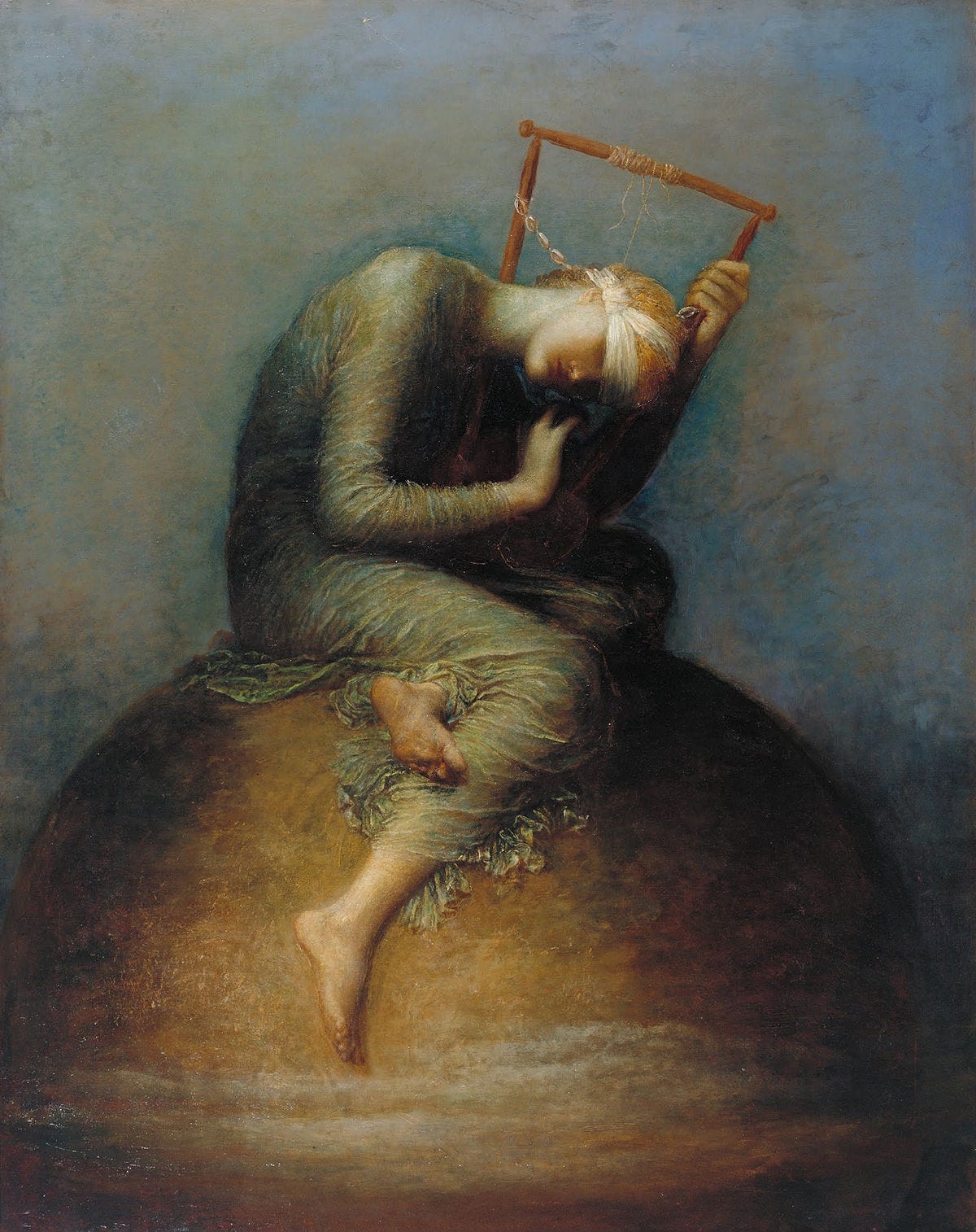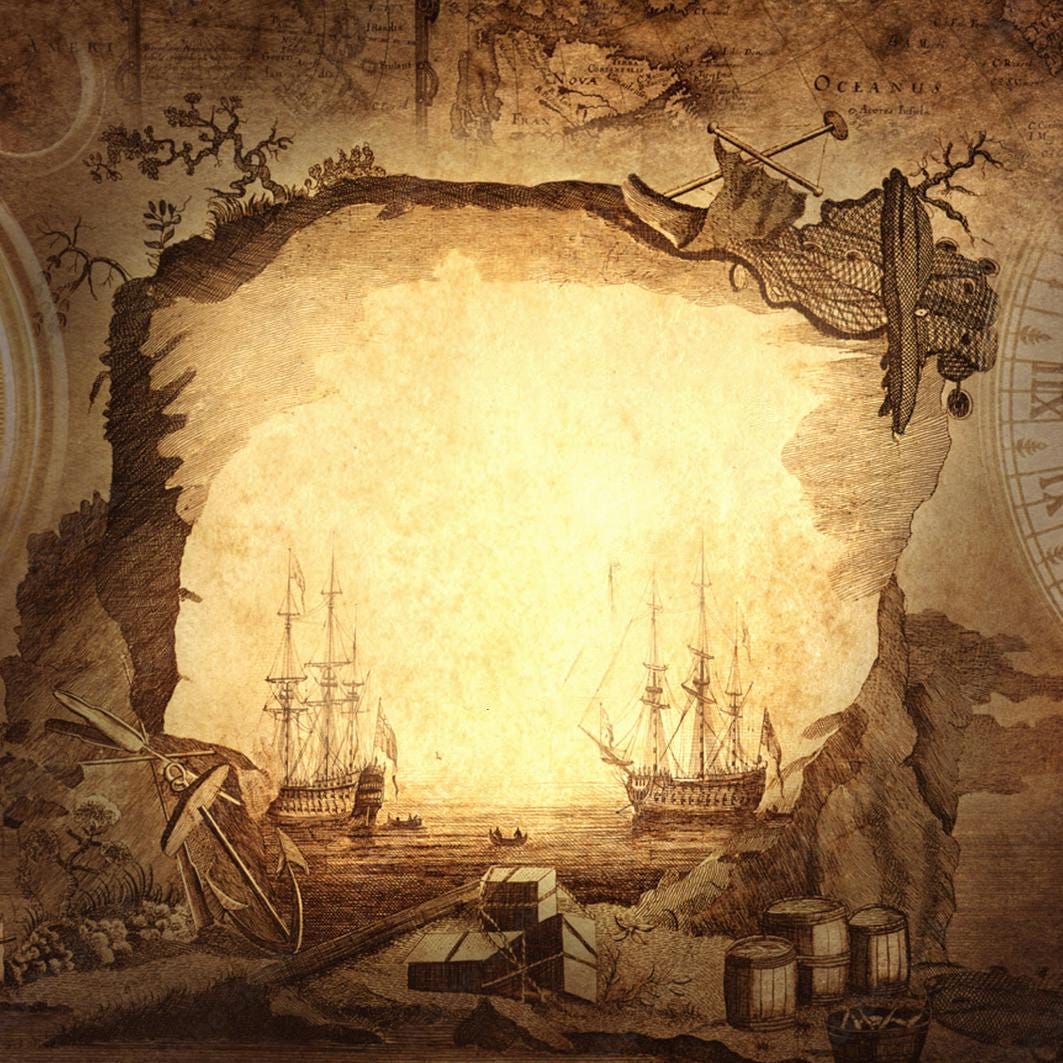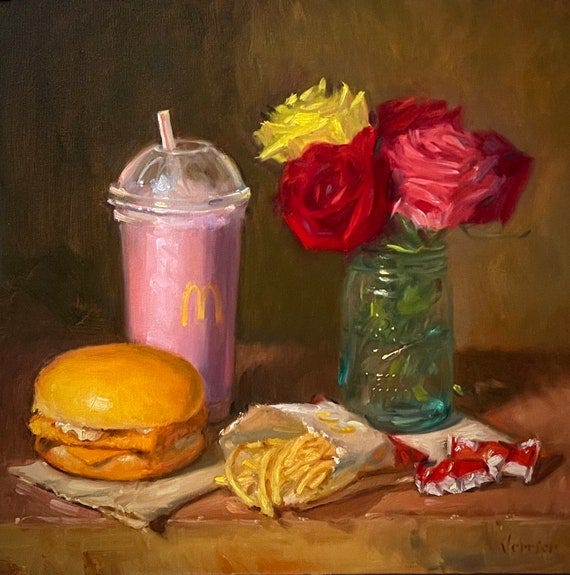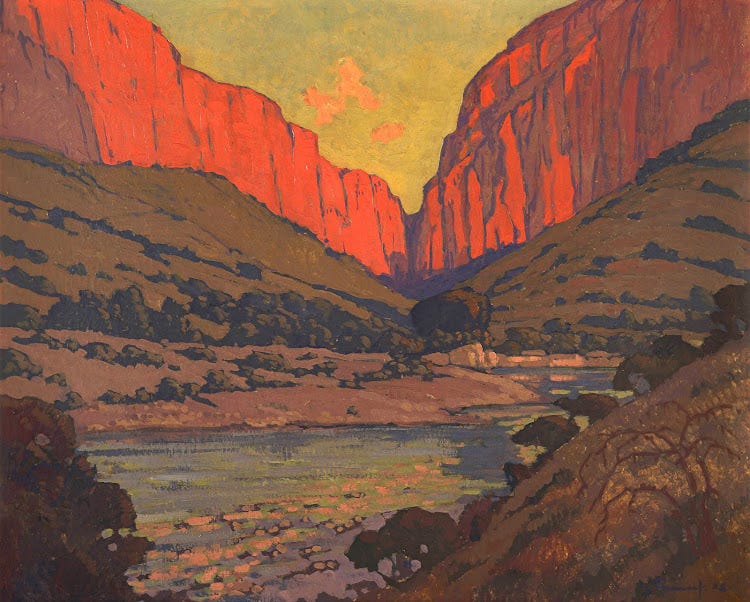Mason & Dixon - Part 1 - Chapter 8: Commodity Fetishism
Analysis of Mason & Dixon, Part 1 - Chapter 8: Ketjap, Dining with the Vrooms, Sitting on the Steps, Fast Food, the Fruit Trade
As we have seen, Dixon has a bit of interest in foreign commodities and modes of life. Whether that be a fetishization of the ‘other’ or a genuine interest in the reality of those native populations’ lives is unclear, though given we have no reason to think otherwise, it’s likely somewhere in between. Because of this interest, he has been “making directly for the prohibited parts of town” (77) whenever dusk came around in order to participate in the trade of ‘Goods’ that occurred in these areas. His need for a unique sensorial experience — be that foods he has never tasted or aromas he has never smelled — drives his journey into those ‘prohibited parts of town’ in the same manner that this need drove others to distant lands never discovered by their nation. He knows that this need is more nefarious than he is willing to admit, and “He feels like a predatory Animal,— as if this Town were ancient to him, his Hunting-Ground” (78).
Dixon’s conversation with Mason reveals the disparity between how the two of them and how the Dutch cope with desire. The Dutch live within a town where, due to its size and small population, the stories of what they do will be known to all. Dixon sees it encompassed by the sea on one side and the Mountains and ‘prohibited’ districts on the other. So, he wonders how they can be so ready and willing to commit whatever sins they wish: “these Dutch carry on as if Judgement be near as the towering seas and nothing matter anymore, especially not good behavior” (78). They believe their fates predetermined and so seem fully willing to accept their place as sinners if it means they can pillage the riches and indulgences of the earth. Dixon, on the other hand, is aware of his sins as well but does not want to fully give in. Therefore, he is like the Dutch in his desire, but unlike them in his unwillingness to fully relent to said desire. Mason, lastly, does not seek these same pleasures. He has the desire, of course, but has come to the land without the forethought of seeking something as the other men do and so is more able to control his urges. Therefore, the presentation of Dixon’s wrongful impulses is not something meant to place blame or judgement upon him but is instead meant to conjure up the comparison between how various men deal with desire. It is clear that Mason possesses the most ‘just’ method of handling it, but this does not render Dixon’s method completely ‘unjust,’ it is merely what most men would seek if presented with something of the sort. The Dutch on the other hand, fully willing not only to seek pleasures of food and drink, but of the flesh, are the truly sinful ones.
And yet, is Mason really so just? For as Jet, the young Vroom daughter, passes by during this conversation, Mason states that he is ready and willing to meet her later. Well, we shall see what comes of this and if Mason really is so commendable in his restraint.
Back at the dining hall with the Vrooms, we see Cornelius a bit less enthusiastic about the Native commodities, though only so with his daughters. He believes that their use of ketjap will lead to a corruption since they will see that the people they have entirely dehumanized actually hold as much humanity, creativity, and culture as they do — perhaps even more. Cornelius on the other hand, having fully developed his own world view, knows that such a thing cannot uncorrupt him (i.e. make him sympathetic to the Natives), and so he can use the substance as he pleases. We thus see the massive complexity behind the ‘commodity.’ It is both a means to corrupt and to ‘uncorrupt,’ a means of pleasure and a means of oppression, something to be imported and exported both of which can hold positive and negative connotations for the producer and the buyer. And a world that will soon find itself centered upon the ‘commodity’ trade will hold all of these meanings and more in the fight to buy, sell, produce, and stake claim over them.
As Mason, Dixon, and the Vrooms leave the dining hall to sit on the steps, Reverend Cherrycoke interjects, stating that “There is something irresistibly perverse […] about a young white woman sitting upon a Stoep in the evening, among the steady coming and going of black servants” (80). He realizes that the image of these young white women, having just dined in comfort, looking out at the land which they own (on paper at least), is more appalling than the image would explicitly present. Because living such a lifestyle on a continent like this would not be typically possible; it would, or should, end up looking like American homesteading. Yet luxury waits for the Vrooms because the hard labor is done not by them — not by those who reap the benefits of hard work — but by the unpaid labor of the slaves. And so, as they sit upon the porch steps, digesting dinner and looking over their demesne, the hard work moves on like theater before their very eyes. The slaves are barely even characters in this theater, at least in the eyes of the Vrooms, and they are reduced entirely to commodities in the same way that the ketjap was, where “these Dutch carry on as if Judgement be near as the towering seas and nothing matter anymore, especially not good behavior” (78). For here, with the slaves, “The more aware of their Sins as they commit them, the more pleas’d be these Cape folk” (80). They are aware that they are literally stealing the life and labor of human souls despite claiming the slaves are less human than them. But this fact, despite them knowing it to be evil, feeds them. If they are going to be sinners who arrive shortly in hell, they may as well make this life upon Earth as heavenly as possible, even if that heaven is built on the bones of others. In this theater that they believe themselves to be in, the women take various roles from chastising and berating the slaves to feigning jealousy over their beauty and (what they would like call) ‘exoticness.’ In the end, the slave becomes a commodity. Like the other commodities be they foods or drink, very often the person is fetishized as well. As Biebel states, “colonial outposts are often depicted as presenting the veneer of ‘civilization’ as an excuse for indulgence in perverse, controlling fantasies of domination” (Biebel, 45).1 The power they hold in this region allows them to not only live within a heaven of their making, but also to take on any role they see fit for the moment, giving them the ability to live multiple lifetimes with various goals, wants, and personalities. They live a thousand different luxurious lives while stripping away the one life that these other men and women possess.
When a population is enslaved — be that through literal slavery, the modern prison system, or wage slavery — one of the last things which a person possesses which they can sell to make their lives more economically bearable, is their body. And it is often women who resort to this work to provide for themselves, their families, or the habits that may have developed out of living such a horribly exploited life. This leads to the unregulated market of sex work — a type of work that the Dutch or what our rulers would consider impermissible. Not impermissible in the sense that this work is sinful, because the Dutch (and our rulers) are well aware that they are committing ‘sins’ equally or far more evil than sex work. And not in the sense that they are attempting to protect these women or the population paying for their services, because the Dutch (and again, our rulers) are well aware that they are imposing far more detrimental practices upon them and us. Yet these are the reasons They will state that something such as sex work must be commodified, regulated, and often removed altogether. The Dutch thus seek an “ever total control, over the sex industry in Cape Town” (81). In reality, what their regulation will do is remove the last thing that these women have that is truly their own. Their bodies will be commodified into a new type of slavery, be that sex slavery or wage slavery related to the sale of their body. The pimps will collect a portion of these women’s surplus labor if the women are paid at all, and these pimps will not even have to perform an ounce of actual work. And with that, the pimps, the colonizers, and the Elite will be able to live out their fetish of seeking out the seedier and more destitute facets of society and humanity. They will get their sexual pleasure of course, but also the power to impose themselves on a person willing to sell themselves, and the satisfaction of committing an act deemed unclean and unholy. All while the last thing these people had is stripped from them for good.
These various iterations on commodity fetishism all move back to food. Mason and Dixon leave the steps, pass the brothels, and return to those ‘prohibited’ areas where they once again indulge in the foodstuffs of the natives. Greet (the middle daughter) and Austra (the slave being forced to seduce Mason) follow and watch as they eat these odd foods: “Curries wild Peacock and Springbok Ragout, / Bilimbi Pickles, and Tamarinds, too, / Bobotie, Frikkadel, Fried Porcupine, / Glasses a-brim with Constantia Wine” (82). It is unclear why these women are following the two, though it wouldn’t be amiss to suspect they are gathering intel for the VOC on members of (or at least people close to) the EIC and the Royal Society. They are competitors in these same markets of course.
The Vrooms hypothesize on “what has driven the Astronomers up the slopes of Table Mountain” (82). Yes, it may be the fact that the food at the Vroom household was nearly inedible for lack of spice and abundance of horrible technique: “Sheep-fat, […] mutton broth […] [and] caudal Stuffata” (82-83). So, this very well may be what led the two to seek other foods such as “Oceanick Fish, African Game, hot Peppers, [and] spices of the East” (83). But in reality, though this was a probable contributor to their momentary abandonments, Mason and Dixon were also likely disgusted by the invisible (to them) violence being perpetrated by the Vrooms onto the African slaves. Mason goes as far to state that he believes “that Vibrations from that horrid family get into their food, which is difficult enough to enjoy to begin with” (83). So while out here, seeking better food and better company, finding all sorts of cuisine, they then come across a man who “cooks as though possessed” (83) performing all sorts of showmanship while cooking and while “his wife hands the food out the window and collects the money” and his “older children carry and prepare whilst younger ones tend the babies in the dark” (84). We are thus seeing the increased demand, for fast food, literally to be called ‘fast food’ in our modern day.2 For, what if instead of taking time and care in producing the most traditional or exemplary iteration of the cuisine of one’s culture, you could produce it quickly for as many people as possible, thus heavily increasing one’s own profits for the same man-hours of labor. Because while we see street food or food truck work as a certain standard of living (and if we are talking about fast food then this coming comparison does not even need elaboration), it would be quite hard to believe that these types of institutions would have existed in the standard pre-colonial, native culture of lands like Cape Town or Southeast Asia or America. Food was always a thing to be enjoyed in company, not to be tossed quickly out of a window and eaten just as fast.
Scenes go by with Mason and Dixon entering dining halls, returning home, talking about food, and so on. It seems that many of these scenes within the chapter are temporally odd. Mason and Dixon’s travels blend together without much transition, showing that their travels between restaurants, dining halls, fast food stands, and the like, are now so common to them that it does not bear importance to define when one is happening one day and another happening tomorrow. Isn’t that similar to how we, in the modernized West, see our own tendencies to dine out or pick-up food on the way home? One of these scenes that goes by is when the two hear about a large batch of mangoes about to ripen and must wait a day to experience what it is like to eat this fruit in its prime. While it is possible to elaborate on this desire, I’m sure by this point you can understand the implications related to the craving for specific and non-local food at any time of the year whenever one desires. Or what that could lead to in regard to trade and the exploitation of land and labor. So, I won’t elaborate any more than I already have.
Reverend Cherrycoke makes another appearance in story of Mason and Dixon, being one of those men finding themselves enamored with the fruit of another continent. The lot of them discuss how they were recently abandoned by the Seahorse along with the food upon the continent, all tying back to the fact that the men on this voyage are expendable while the products they are interacting with are not. And in turn, these expendable men, our English Mason, Dixon, and Cherrycoke, are no more or less important than the Vrooms. For while the Vrooms may believe themselves to be wholly more necessary than the astronomers, they are just another minor branch of the Empire that they represent; and as Mason realizes this, saying, “How foolishly did I believe I’d escap’d these perfumes of Gloucestershire,— nay,— at the Dutchman’s Table, I am return’d to them, as to a kind of Hell,” (86) he too sees, subconsciously, that he is serving the same colonial purpose that the Vrooms are.
Cherrycoke is taking this all down in his journal as an observer of these events, these revelations, and these juxtapositions. He “sought distraction in the study of other Lives” (86) as a means to comprehend his own place among them. He attempted to incite some realization of power structures and class consciousness upon his own continent, and yet here he was indulging in the same delicacies which furthered the goals and plans of the Elite. So how much better was he than they were? Was he just as complicit in this fetishization? Were Mason and Dixon the same? Or are all of them inevitably drawn into these desires and actions which in turn further the goals of those Shadow Leaders who truly reap the rewards?
Up Next: Part 1, Chapter 9
Note: Very sorry for the wrong post today. I accidentally scheduled things incorrectly!
Biebel, Brett. A Mason & Dixon Companion. The University of Georgia Press, 2024.
While this scene also seems like it could be inferring the coming of ‘food trucks,’ it is more likely fast food since food trucks did not become widespread in America until the Great Recession around 2008 and Mason & Dixon was published in 1997. Though, with a few twists and turns, they both could be used to represent the same idea. It could also be referencing street food which is technically a form of fast food and would have been prominent in New York City where Pynchon lived while writing Mason & Dixon, or the street food of places like Southeast Asia. Street food is not as close a comparison as fast food and food trucks are, though there is technically some connection. Either way, it seems most likely that he is referencing fast food here.









You write "It seems that many of these scenes within the chapter are temporally odd." Good observation.
I recall being struck by this as I was re-reading the section myself, and by the sense of disorientation that resulted. This was some years ago and apparently the thought has stayed with me. I literally felt like I was wandering around and getting lost in the chapter.
I would hazard a guess that TRP's intention was to show that same sense of temporal oddity on M&D's part, and if the reader got it too, so much the better.